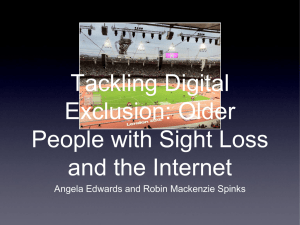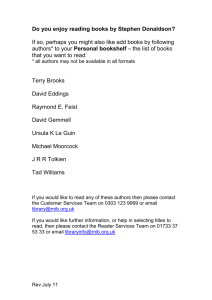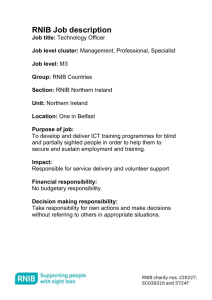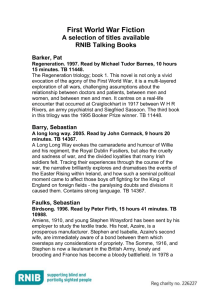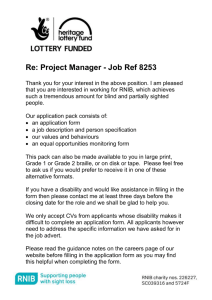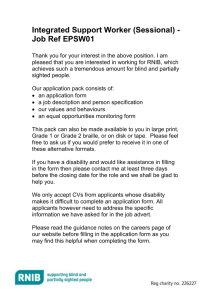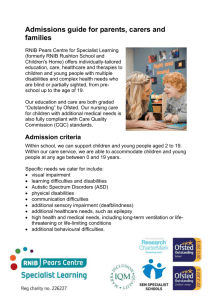Preparing for a social care assessment
advertisement
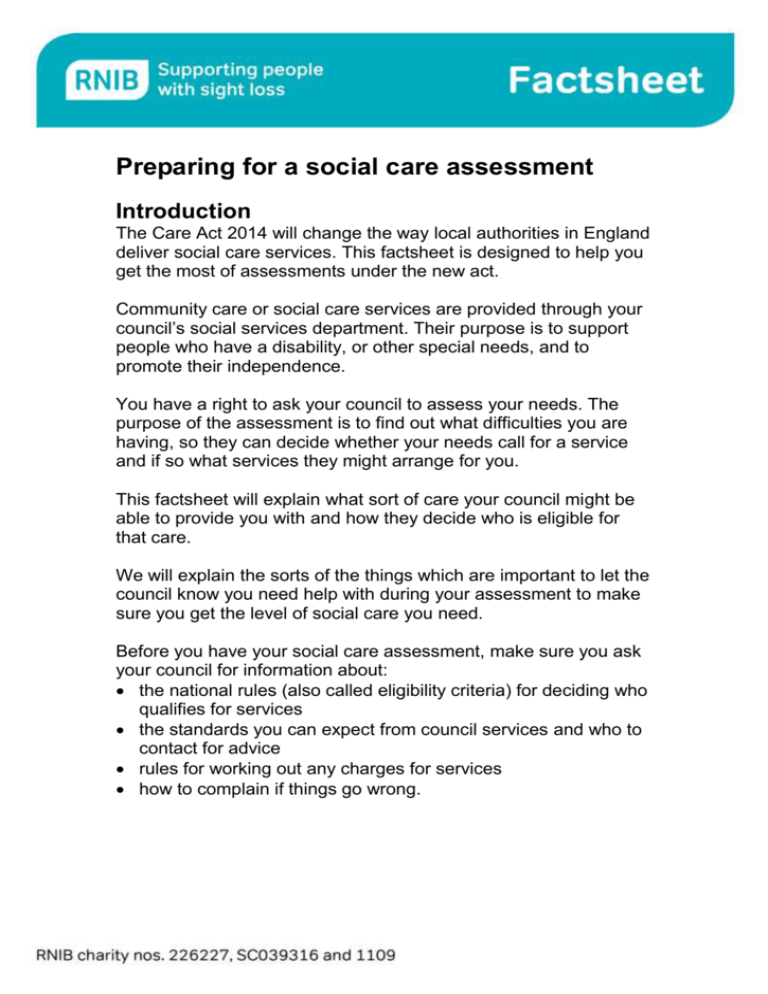
RNIB – supporting people with sight loss Factsheet Preparing for a social care assessment Introduction The Care Act 2014 will change the way local authorities in England deliver social care services. This factsheet is designed to help you get the most of assessments under the new act. Community care or social care services are provided through your council’s social services department. Their purpose is to support people who have a disability, or other special needs, and to promote their independence. You have a right to ask your council to assess your needs. The purpose of the assessment is to find out what difficulties you are having, so they can decide whether your needs call for a service and if so what services they might arrange for you. This factsheet will explain what sort of care your council might be able to provide you with and how they decide who is eligible for that care. We will explain the sorts of the things which are important to let the council know you need help with during your assessment to make sure you get the level of social care you need. Before you have your social care assessment, make sure you ask your council for information about: the national rules (also called eligibility criteria) for deciding who qualifies for services the standards you can expect from council services and who to contact for advice rules for working out any charges for services how to complain if things go wrong. RNIB charity numbers 226227, SC039 316 and 1109 What are social care services? Social care services may include: personal care at home domestic help shopping meals on wheels services in day centres provision of equipment care in residential or nursing homes. Whether you get any of these services depends on the outcome of your assessment. What is an assessment? Your council should arrange for a social worker to look at your full range of needs, goals and wishes. This is with the aim of promoting your “wellbeing”, the overarching principle local authorities must now use when making decisions about any care they provide you. This is done by considering your: personal dignity physical and mental health and emotional wellbeing control by the individual over day-to-day life domestic, family and personal circumstances. The assessment should not just consider your immediate needs, but should also look at preventing any care needs developing in the future. The social worker should look at identifying your needs and how these impact your wellbeing, as well as the outcomes you wish to achieve day-to-day. As well as social workers, assessments can also be carried out by Rehabilitation Officers. Rehabilitation Officers are specifically trained to work with blind and partially sighted people. They are rnib.org.uk able to carry out assessments and will cover the support you need specifically in coping with your loss of sight. An assessment should look at your needs in these areas: ability to prepare and eat food personal care, including laundry ability to use the bathroom being properly dressed ability to use your home safely maintaining a safe home such as cleaning keeping up family ties accessing work, training and education making use of local services, including transport looking after your children If you have been recently diagnosed with sight loss your local authority should make contact with you within two weeks of receipt of your Certificate of Vision Impairment. If you are in need of care and support an assessment should be arranged in a timely manner. For more information about getting your sight loss certified by an ophthalmologist, please call our Helpline on 0303 123 9999. Alternatively, you can contact your local authority’s social services team directly and ask for an assessment. Ask how long you might have to wait for an assessment. You should generally not have to wait longer than six weeks, so call our Helpline on 0303 123 9999 for advice if you have been waiting longer than this. What happens at an assessment? There are many different types of assessments. The most effective type is a face-to-face assessment since it is much easier to show the help you need in person. If you are refused a face-to-face assessment contact us for advice. rnib.org.uk The assessment is usually done at your home by a social worker or Rehabilitation Officer, although you should request a Rehabilitation Officer attends if this is not offered since they are likely to understand your needs better. Other specialist workers may be involved if you have complex needs. If you have hearing loss as well, you have a right to be visited by a worker trained to assess the needs of people with dual sensory loss. If you have needs other than just social care, such as housing or health, the different organisations should work together so that you do not have to have several different assessments. During your assessment make sure you explain how your sight problem affects your everyday life and independence. You can ask for the assessment to run over more than one session if you find it tiring and need to take a break. If someone helps to look after you, their needs and wishes will be taken into account through a separate Carer's Assessment. This may or may not be provided at the same time as yours and will identify any support needed to help them in caring tasks. Will I get the services I need? Your local authority will follow the Care and Support (Eligibility Criteria) Regulations 2014, which accompany the Care Act 2014, when assessing your needs. Under the guidance there are national eligibility criteria all individuals must meet to receive care from their local authority. The three conditions of the criteria are: 1. 2. 3. That your need is due to a physical or mental impairment or illness As a result of that impairment you are unable to achieve two or more specific outcomes (we will look at what these “outcomes” are below) As you are unable to achieve the outcomes there is, or there is likely to be, a significant impact on your wellbeing. rnib.org.uk Your need for help is only eligible if you meet all three of these eligibility criteria conditions. Meeting the eligible conditions We will now look in more detail at the eligibility criteria conditions so that you will be able to consider whether you would meet these. What does “needs due to impairment or illness” mean? To satisfy the first criteria you must be able to show that your care needs arise as a direct result of your sight loss, or any other impairments or illnesses you have. What does “unable to achieve” mean? It might sound strange, but “unable to achieve” does not just mean that you cannot do something outright. You can also be considered as “unable to achieve” an outcome if doing so causes you significant pain or takes you much longer than if you didn’t have any impairment. The full definitions considered in the second criteria are: Unable to achieve without assistance: This includes when you cannot do something even when help is given or you need prompting to do it. Able to achieve, but this causes significant pain, distress or anxiety: This could include concerns and worries that you have in going out alone. Is able to achieve, but this endangers, or is likely to, the health and safety of the person or others: This could include preparing a meal as you are unable to see that food is out of date or you burn yourself when using the cooker. Is able to achieve, but takes significantly longer than normal to do so: This could include accessing letters, which you struggle to read, the result being that you are left both physically and mentally exhausted. rnib.org.uk What are the “outcomes” mentioned above? The outcomes listed in the guidance are very specific. We have included a table below to show the outcomes and how they might apply to you. Specific outcome Managing and maintaining your nutrition Maintaining your personal hygiene Managing your toilet needs Being appropriately clothed Being able to make use of the home safely Maintaining a habitable home environment Developing and maintaining family and other personal relationships Accessing and engaging in work, training, education and volunteering Making use of necessary facilities or services in the local How it might apply to you Do you have access to food and drink and can you prepare and eat it? Can you wash yourself and your clothes? Can you access and use the toilet? Can you dress yourself and are the clothes appropriate for the weather so that you remain healthy? Can you enter, exit and move around your home safely? Can you use the stairs, the kitchen or the bathroom? Is your home sufficiently clean and maintained to be considered safe? Do you have access to water, electricity and gas as appropriate? Have you become lonely and isolated as you are unable to maintain relationships or because your disability stops you forming new ones? If you wish to undertake such activities is something stopping you, such as a lack of access to facilities or a lack of support? Can you get around your local area and can you use the rnib.org.uk community, including public transport and recreational facilities Carrying out any caring responsibilities you have for a child services provided? Does your disability have an effect on your role as a parent if you have children? Remember, to meet the second eligibility criteria you have to be unable to meet two or more of these outcomes. What does “significant impact on your wellbeing” mean? If you meet the eligibility criteria, your “wellbeing” is a principle which is meant to guide the decisions your local authority make in providing you with appropriate care. It includes your: personal dignity physical and mental health and emotional wellbeing control over your day-to-day life domestic, family and personal circumstances. Whether your inability to achieve at least two of the specific outcomes above impacts your wellbeing in a significant way is harder to define, since there is no legal definition in the Care Act 2014 of what “significant” means. How this is interpreted will therefore vary between local authorities, and it will probably take some time, once people start receiving care under this new guidance, before we are able to be clearer about what this means. How can I get the best out of the assessment? Before the assessment meeting, think about how your sight loss is affecting your day-to-day life. Think about the outcomes in the table above and how they relate to you. You should also think about what you would like to be able to achieve if you were given services and support. You might want to make a note, over a week or so, of the difficulties you have with day-to-day activities, and of times when your sight problem prevents you doing something. You should also rnib.org.uk list if you have an accident or were put at risk because you do not have the support you need. Make sure you get a copy of your council's information leaflet(s) about social care assessment and eligibility criteria. The Care Act guidance clearly states that all information should be in accessible formats, including on your council's website. You can then think about how your difficulties fit with the eligibility criteria. The following list suggests areas where someone with a sight problem might need some support in relation to the specific outcomes already listed. You might think of different examples yourself; everyone’s circumstances are different. Some common issues to think about Managing and maintaining nutrition Do you have difficulties in preparing and/or eating food and drink? Examples of this maybe: finding cutlery, pots and pans and ingredients peeling and chopping vegetables boning meat or fish checking “use by” dates on packages or spotting mould on foods safely heating oil and boiling water Maintaining personal hygiene Do you need help with managing personal care and hygiene? For instance, with: getting in and out of the bath or shower checking your cleanliness shaving or putting on make up washing, drying and styling your hair cutting your fingernails and toenails getting in and out of bed, especially during the night washing, drying and ironing clothes changing bed linen rnib.org.uk Managing toilet needs Do you experience difficulties with: getting on and off of the toilet using the toilet Being appropriately clothed Do you have any problems in: choosing clean clothes that match and are appropriate for the weather fastening buttons, tying shoelaces, making sure clothes are not being worn inside out Being able to make use of the home safely Are you able to enter and move around your home safely? Is your home suited to your needs? Do you need advice about accommodation, including any adaptations your home might need such as improved lighting, guide rails, or changes to the kitchen? Do you need assistance to access your home such as braille markings in the communal lift, or guide strips on steps to the building? Maintaining a habitable home environment Is your home clean and safe from dangers and hazards? Do you need help with: keeping kitchen surfaces and appliances clean and hygienic washing up, drying and storing crockery, cutlery, glasses and cookware clearing away uneaten food and taking rubbish outside clearing up breakages or spills sweeping and vacuuming floors installing and maintaining smoke alarms, intruder alarms and domestic appliances general household maintenance (eg changing light bulbs, replacing fuses) maintaining a safe environment (eg making sure there are no loose carpets to trip on or obstacles to bump into) rnib.org.uk adjusting your central heating, hot water temperature controls and ventilation controlling lighting and domestic appliances maintaining your privacy (eg drawing curtains, locking doors) responding to emergencies Developing and maintaining family and other personal relationships Is your sight loss causing difficulties with keeping in contact with people? Are you struggling with: living alone maintaining family or domestic roles keeping in touch with friends and family the death or illness of a spouse, relative or carer the death or loss of a guide dog Do you feel like your disability is making you social isolated? Accessing and engaging in work, training, education and volunteering Is your sight loss making it difficult for you to: find voluntary work in the community look for a new job, because you recently lost your previous job because of your sight loss cope with changes to your education, which has been disrupted due to your sight loss Making use of necessary facilities or services in the local community including public transport and recreational facilities Are you unable to get around safely on your own outdoors? For instance, when out and about, do you have difficulties: crossing the road avoiding obstacles and tripping or falling in the street using public transport (eg reading timetables, finding the right train platform or bus stop, finding a seat) or hailing a taxi rnib.org.uk reading street signs asking for assistance when you are lost going to pubs, restaurants, sports events and theatres taking part in religious worship avoiding traffic accidents coping with disorientation after moving house Do you need information and advice about using transport, including local concessions and schemes? Are you able to get out to do your own shopping? Can you get to local shops and facilities, visit friends or attend social activities or classes? Carrying out any caring responsibilities the adult has for the child Are you able to carry out your caring responsibilities, such as parenting for your own child or babysitting for others? You may also care for sick or disabled family member and friends. If you do, then a carers’ assessment maybe appropriate. Contact Carers UK for more information on carers’ assessment. Similarly if someone is already providing some care for you, they are also entitled to a carers’ assessment. Other issues to highlight Below are some other issues that you should also highlight to the individual undertaking your care assessment. Equipment and adaptations Would special equipment help you to manage everyday tasks? Your need for equipment (called “community equipment”) should be included in the assessment. Your local authority should supply you with any aids or equipment you need which costs less than £1,000. Communication Do you need a radio and CD player, to help you with leisure and accessing information? rnib.org.uk Do you need extra help because you have hearing loss or are deafblind? Do you have problems with reading utility bills, labels on food, cleaning products, medicine bottles, text messages or reading and replying to personal mail? Would you benefit from access to a computer with internet access, or a reading machine or CCTV? Social and leisure activities Do you have difficulties with, for instance: reading for pleasure gardening needlework, knitting or sewing painting, writing or other artistic or cultural activities watching television and setting a video recorder identifying tapes and compact discs arranging a holiday Your health Do you have another disability or a health problem which affects your daily life? Do you have difficulties in staying healthy or managing medical conditions, for example: identifying the correct tablets to take measuring the correct dosage of drugs and medicines reading the instructions on medicine bottles using eye drops managing serious conditions such as diabetes (e.g. testing blood sugar and urine, injecting insulin) taking enough exercise and keeping fit Would you like to talk to someone about adjusting to your disability, or do you feel you need some emotional support? This might be if you have a further deterioration in your physical or mental health, you have additional disabilities or health needs or are discharged from hospital. rnib.org.uk Planning your care Once you have had your assessment, you should be as involved in developing and shaping your care plan as much as you can; your local authority will assume that you will play a strong role in planning it. However, you can choose to have less of a role in planning your care if you like. The local authority’s role in care planning should ideally be just writing up the document and signing it off to ensure it meets all the needs that have been identified. Your local authority will provide you with clear information on the cost of your care and support; this is termed your personal budget. Your local authority will also ask whether you want to control your personal budget yourself, via direct payments, and they will explain how this works. Supporting your needs There are a number of ways that your local authority can support you needs. This could include, but is not limited to: providing reablement or prevention services putting you in touch with services provided by voluntary or community organisations providing you with a personal budget to buy services to meet your needs Your final plan should include: the needs identified by the assessment how your needs meet the eligibility criteria conditions what needs your local authority are going to meet and how under what outcome the need is being provided if you are a carer, what you want to achieve regarding work, education and leisure your personal budget (how much money will be provided) information and advice on how to reduce your needs and to prevent future needs developing rnib.org.uk if you receive direct payments, how much and when you will receive these. Help that is not provided You may have some needs that your local authority will not provide. These are referred to as either “ineligible needs” or “unmet needs”. If you have needs that are unmet then your local authority must give you a written explanation (in a format which is accessible for you) of the reason for its decision. This should be written for you personally, addressing your individual unmet needs, and not a standard template they send to others. It should also include information and advice on how you can reduce or delay your needs in the future, such as highlighting local community organisations that may be able to help. If you do receive some support, your care plan should include the information on your unmet needs in the same document. Financial assessment Any assessment of your financial situation, in relation to charges for services, should be carried out promptly after the assessment of your need for care. It should not affect your right to an assessment or your eligibility against the criteria. For further information on charges your local authority has requested you pay, please see our “Challenging charges for community care services” factsheet. Care Review One your care plan has been finalised, if your local authority wants to reduce or withdraw a service from you it must first undertake a review of your care needs. To not do so maybe unlawful. Remember that you can also ask for a review if your needs change. rnib.org.uk Further information RNIB Helpline is your direct line to the support, advice and products you need to remain independent. We’ll help you to find out what’s available in your area and beyond, both from RNIB and other organisations including Action for Blind People. Whether you want to know more about your eye condition, buy a product from our shop, join our library, find out about possible benefit entitlements, be put in touch with a trained counsellor, or make a general enquiry about living with sight loss, we’re only a call away. Tel: 0303 123 9999 Email: helpline@rnib.org.uk We are ready to answer your call Monday to Friday 8.45am to 5.30pm. Outside these times leave us a message and we’ll get back to you as soon as possible. The factsheet is not an authoritative statement of the law, and is for general guidance only. Please let us know if you use a language other than English. We will try to arrange a telephone interpreting service. RNIB Legal Rights Service February 2015 rnib.org.uk
